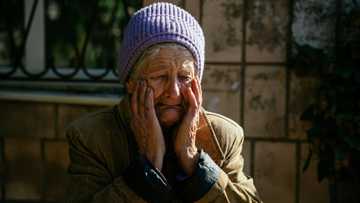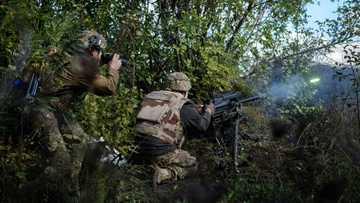Cold weather brings tougher conditions to fighting in Ukraine

Source: AFP
The approach of winter will bring tougher conditions to Ukraine including heavy mud, snow and freezing cold that will make operations more difficult for both sides in the war.
Kyiv -- which is fighting to retake areas seized by Moscow -- has more to lose from a slowdown that leaves its territory in Russian hands, and time is running out for it to capitalize on recent battlefield successes before bad weather sets in.
While frontlines in Ukraine may become more static due to weather conditions in the next few months than they have been in recent weeks, that does not mean offensive operations will stop completely.
"I expect that Ukraine will continue to do everything it can throughout the winter to regain its territory and to be effective on the battlefield," US Defense Secretary Lloyd Austin told journalists in Brussels last week, while acknowledging that "winter always presents a challenge when it comes to fighting."
Mark Cancian, a retired US Marine Corps officer who is a senior adviser at the Center for Strategic and International Studies, agreed that the fighting will continue, noting that the war began during the winter with the Russian invasion in February.
"I think you'll see some slowdown starting shortly when the mud starts to hit," Cancian said, and then "it'll pick up in the winter."
PAY ATTENTION: Join Legit.ng Telegram channel! Never miss important updates!
Winter equipment
That does not, however, mean that winter combat will be easy: Troops will struggle to stay warm, both vehicles and weapons will be more difficult to maintain and operate, and snow can make it more difficult to detect landmines, among other problems.

Source: AFP
Michael O'Hanlon, a senior fellow at the Brookings Institution, said it is difficult "living in the field, doing equipment maintenance in the field, and keeping vehicles running when temperatures get low."
"These facts do not preclude the possibility of some combat but they do constrain its likely character," he said.
Cancian said the fighting may increasingly focus on villages because of the shelter they provide to whoever controls them.
Ukraine has an advantage in terms of the supplies it is receiving from NATO and other countries, which include cold weather equipment, while Russia has struggled with significant logistical problems in the course of the war.
Canada is supplying 500,000 items of winter clothing, including jackets, pants, boots, gloves and parkas, while Lithuania is providing cold weather gear for some 25,000 Ukrainian soldiers.
Germany has delivered hundreds of thousands of winter hats, jackets and pants to Ukraine, and the United States and Britain have also included winter clothing in recent assistance packages for Kyiv.
It is important for Ukraine's forces to build on recent successes soon, and not just because of the approach of winter: Russia's mobilization of additional troops has been plagued by myriad problems, but will deliver more soldiers to the battlefield, Cancian said.
'Psychological factor'
Russia hopes that "the mobilization and the weather will stabilize the frontlines," he said.
Then, Moscow can prolong the war in the hope that European support for Ukraine will crack under the pressures of inflation and high energy prices as the weather cools -- a strategy Cancian believes will be unsuccessful.
Russia has also carried out devastating strikes targeting cities and energy infrastructure in Ukraine, increasing the pressure on the country's civilian population ahead of winter.
Ukrainians "are experiencing hardship and... sacrifice, but they're nowhere near cracking. And I don't think anyone expects that the morale of the Ukrainians will crack," Cancian said.
Gian Gentile, a former US Army officer who is a senior historian at the RAND Corporation, said Ukraine's advantage in morale could help its forces get through tough winter fighting.
"They believe they're in a war for their existence, and they do seem to have a strong will to fight, which does not seem to be in place with Russian ground forces," Gentile said.
"As a psychological factor, that can... help in dealing with the cold, harsh weather."
Source: AFP




